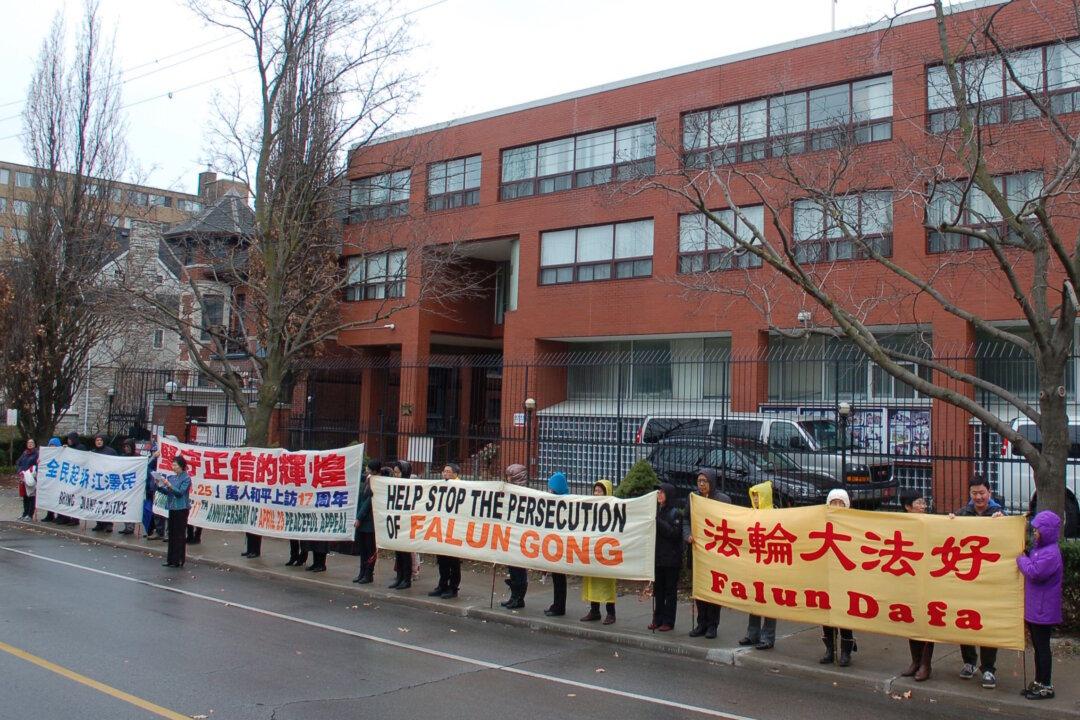Canadian Falun Gong practitioners held events this week in major cities across the country to commemorate their fellow practitioners’ large-scale appeal in Beijing 17 years ago seeking the freedom to practise their faith.
At solemn rallies and candlelight vigils in front of the Chinese embassy in Ottawa and Chinese consulates in cities including Vancouver, Calgary, and Toronto, practitioners paid honour to the peaceful demonstration of April 25, 1999, that they describe as a “historic appeal” as well as a “silent appeal.”
It was when over 10,000 adherents of the popular Chinese spiritual discipline gathered outside Zhongnanhai, the Chinese regime’s central headquarters in Beijing, to protest the beatings and unjust detention of practitioners in the nearby city of Tianjian.
This significant event was the last time practitioners were able to gather before the full-scale persecution began in July 1999, leading to a massive hate and terror campaign against Falun Gong that has engulfed the entire country and that continues today, according to a media advisory issued by the group in Ottawa.
Among the practitioners at this week’s events in Canada were those who were at the April 25 demonstration 17 years ago.

The happenings of that day are still vivid in the mind of Wang Zhiyong of Vancouver.
“When I arrived near Zhongnanhai, I saw many Falun Gong practitioners already there, who were very orderly and standing quietly,” said Wang, who was then a successful businessman in China.
Because the Tianjian police had arrested practitioners without reason, everyone’s expression was very grim, Wang said, but “there was no excessive conduct whatsoever. Everyone was very calm and peaceful, wanting to tell the leadership of the Communist Party about the situation, hoping for the release of the practitioners and that Falun Gong books could continue to be published, and that we could have a legal environment to practise our belief.”

The guiding principles of Falun Gong are Truthfulness, Compassion, and Forbearance, and Wang noted that the practitioners were true to those principles. Because of everyone’s peaceful conduct, even the police officers were quite at ease as they stood aside, he said.
As night began to fall, the appellants heard from their representatives who had gone into the Zhongnanhai compound to speak with the senior officials that the requests they had made had been resolved, and that then premier Zhu Rongji had told the Tianjin authorities to immediately release the detained practitioners. So everyone quietly dispersed.

“Many ordinary citizens were also there observing and witnessing. With such a large number of practitioners appealing, yet there were no slogans shouted, only a peaceful and quiet atmosphere,” said Li Xia from Ottawa, who was also at the event in 1999.
In the evening, when the practitioners learned that the issues had been resolved, they cleaned up the site before they left, making sure there was no garbage left behind, Li said.
“This event was unprecedented in history,” she said. “April 25 was the beginning of Falun Gong practitioners’ effort to let the world’s people know about the goodness, kindness, and peacefulness of their practice and its true principles.”

This effort continues today, as despite having received reassurance of their constitutionally protected freedom of belief that day from then premier Zhu, then Chinese Communist Party leader Jiang Zemin launched a violent persecution against Falun Gong a few months later in July 1999.
Jiang’s displeasure at how the premier had peacefully handled the situation could already be seen on the night of the mass appeal in a letter he wrote to senior Party leaders.
“How can the Marxism we communist party members represent, the materialism and atheism we believe not conquer what Falun Gong advocates? Otherwise, wouldn’t it be a big joke?” he wrote, adding, “It’s high time for our leaders at every level, particularly the senior ones, to be clear-minded.”
Reports by investigators, government agencies, and human rights organizations around the world paint a dark picture of the severity of the persecution of Falun Gong. Both Human Rights Watch and the U.S. State Department have cited sources suggesting that at least half of the inmates in the hundreds of forced labour camps across China are Falun Gong practitioners.
Former Canadian cabinet minister David Kilgour has noted that former detainees whom he and international human rights lawyer David Matas have interviewed outside China “consistently indicated that Falun Gong were both the largest group in the camps and were singled out for systematic torture and abuse.”
Investigative journalist Ethan Gutmann estimates that about 65,000 Falun Gong prisoners of conscience were killed from 2000 to 2008 through forced organ harvesting to supply a lucrative trade in human organs.




